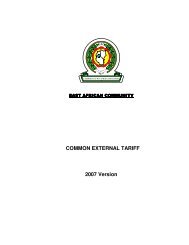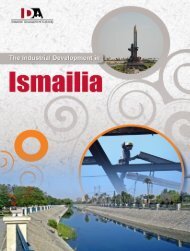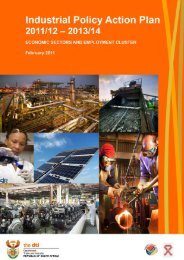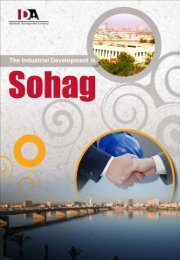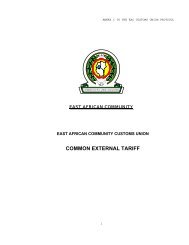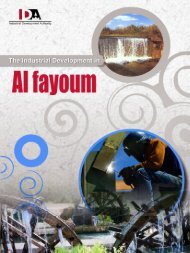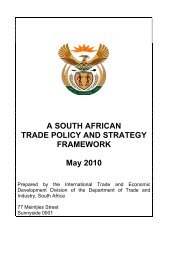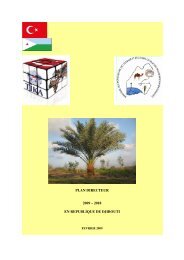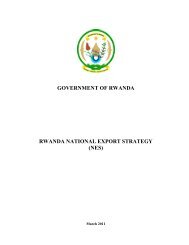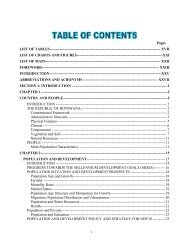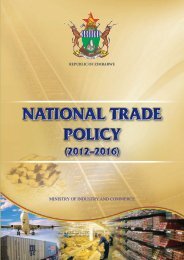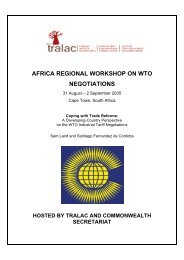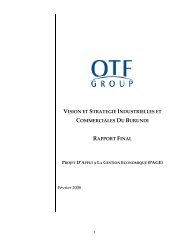- Page 6 and 7: ACRONYMS AND ABBREVIATIONS AIDS ARI
- Page 8 and 9: NACHE NAI NAMCOL NANGOF NATO NBC NC
- Page 10 and 11: Why Vision 2030? A national vision
- Page 12 and 13: national security, regional securit
- Page 14 and 15: Namibia’s 2030 Vision is one of t
- Page 16 and 17: Sustainable Development ... develop
- Page 18 and 19: REPUBLIC OF NAMIBIA Prosperity, Har
- Page 20 and 21: TABLE OF CONTENTS Page ACRONYMS AND
- Page 22 and 23: ACRONYMS AND ABBREVIATIONS AIDS ANG
- Page 24 and 25: FOREWORD Why Vision 2030? Dr. Sam N
- Page 26 and 27: the exigencies of industrial transf
- Page 28: challenge the business community to
- Page 31 and 32: their own development and promote d
- Page 33 and 34: 2.1.1 Prosperity There is a conditi
- Page 35 and 36: uption programmes, and monitor acti
- Page 37 and 38: they live, and what do they do for
- Page 39 and 40: structure (transport and communicat
- Page 41 and 42: 24 ing communicable diseases, such
- Page 43 and 44: 3.4.2 Macro-economic environment Na
- Page 45: 28 There is a sound macro-economic
- Page 49 and 50: Information & Communication Technol
- Page 51 and 52: science and technology in such a wa
- Page 53 and 54: The young people of Namibia are edu
- Page 55 and 56: 3.6.4 Culture, Religion, Morality a
- Page 57 and 58: of dams is evident. There is no atm
- Page 59 and 60: addition, greater user participatio
- Page 61 and 62: adding of harvested fish, the secto
- Page 63 and 64: 3.8.1 Development cooperation Devel
- Page 65 and 66: 48 The intellectual point of depart
- Page 67 and 68: Democratic Governance Things to do
- Page 69 and 70: ant, and a mature, investigative an
- Page 71 and 72: a well-established and functioning
- Page 74 and 75: 4. IMPORTANT MILESTONES ON THE ROAD
- Page 76 and 77: Selected Targets for the Water Sect
- Page 78 and 79: Selected Housing Sector Targets i.
- Page 80 and 81: 4.4.2 Building and Restructuring Na
- Page 82 and 83: Agro and Natural Resources With div
- Page 84 and 85: Figure 4.4.2: Percentage Shares of
- Page 86 and 87: 2010: • The ICT graduates establi
- Page 88 and 89: Major Indicators Period Population
- Page 90 and 91: Figure 4.5.2: Life Expectancy at Bi
- Page 92 and 93: 4.6.2 Future water demand and fresh
- Page 94 and 95: KEY INDICATORS 2001 Current Situati
- Page 96 and 97:
Income and benefits generated from
- Page 98 and 99:
• Debt-relief has been affected i
- Page 100 and 101:
2020 - 2025 • SADC Protocol on Po
- Page 102 and 103:
5. THE CHALLENGES WE FACE Namibia i
- Page 104 and 105:
ing an enabling environment already
- Page 106 and 107:
5.5 Private Sector Participation Na
- Page 108 and 109:
1. BACKGROUND TO VISION 2030 1.1 IN
- Page 110 and 111:
Leaders’ in the country was condu
- Page 112 and 113:
on the steps described above, three
- Page 114 and 115:
Figure 2.1: The 13 regions in Namib
- Page 116 and 117:
2.3 PEOPLE Namibia’s population s
- Page 118 and 119:
decimated their population groups,
- Page 120 and 121:
pregnancy or during or after birth,
- Page 122 and 123:
create a safer, healthier and more
- Page 124 and 125:
Working to achieve sustainable deve
- Page 126 and 127:
3. NAMIBIA VISION 2030 3.1 INTRODUC
- Page 128 and 129:
in accordance with the Constitution
- Page 130 and 131:
(xiv) (xv) (xvi) Upholding human ri
- Page 132 and 133:
Year Low Variant Medium Variant Hig
- Page 134 and 135:
Targets for Population and Health
- Page 136 and 137:
Sub-Vision There is free movement o
- Page 138 and 139:
The 2001 total population of 1,830,
- Page 140 and 141:
Objectives The objectives are to: E
- Page 142 and 143:
The above Government strategies and
- Page 144 and 145:
Objective The overall objective is
- Page 146 and 147:
Promoting Healthy Human Environment
- Page 148 and 149:
4.2 WEALTH, LIVELIHOOD AND THE ECON
- Page 150 and 151:
fishing sector. Employment in the p
- Page 152 and 153:
Objective To ensure that Namibia is
- Page 154 and 155:
Transport Infrastructure Things to
- Page 156 and 157:
Strategies The broad strategies of
- Page 158 and 159:
In 1995, the Ministry of Agricultur
- Page 160 and 161:
Employment and Unemployment Things
- Page 162 and 163:
Botanical Research Institute; DRFN;
- Page 164 and 165:
Objectives • To organise and co-o
- Page 166 and 167:
Figure 4.9: Access by Households to
- Page 168 and 169:
Targets for ICT Development The fut
- Page 170 and 171:
4.3.2 Production Technology Natural
- Page 172 and 173:
esources in some areas is decreasin
- Page 174 and 175:
Objectives • To achieve enhanced
- Page 176 and 177:
other organisations. The proportion
- Page 178 and 179:
Targets for Education and Training
- Page 180 and 181:
Medical Doctors Demand for medical
- Page 182 and 183:
Objectives • To ensure an integra
- Page 184 and 185:
According to the 2001 Population Ce
- Page 186 and 187:
for children, among relevant stakeh
- Page 188 and 189:
4.4 EQUITY: INDIVIDUALS, COMMUNITY
- Page 190 and 191:
in rural areas, making their living
- Page 192 and 193:
Poverty reduction Things to do •
- Page 194 and 195:
Figure 4.14: Housing Coverage 1990
- Page 196 and 197:
households are often worse off than
- Page 198 and 199:
4.4.3 Youth and Development The 200
- Page 200 and 201:
Some of the youth have special need
- Page 202 and 203:
• Reduce the number of youth offe
- Page 204 and 205:
SENIOR CITIZENS Things to do • Me
- Page 206 and 207:
People with disability are often pr
- Page 208 and 209:
Fostering and Orphanage Things to d
- Page 210 and 211:
differences will gradually be solve
- Page 212 and 213:
• Ensuring that the country’s m
- Page 214 and 215:
Civic Affairs Things to do • Crea
- Page 216 and 217:
abuse, occurs throughout urban and
- Page 218 and 219:
4.4.10 Civil Society and its Organi
- Page 220 and 221:
identifying their institutional pro
- Page 222 and 223:
Objectives To uphold the family as
- Page 224 and 225:
problem of distributing the availab
- Page 226 and 227:
Targets for Freshwater and Associat
- Page 228 and 229:
• sustaining the coastal and mari
- Page 230 and 231:
• On average freehold agriculture
- Page 232 and 233:
Objective To ensure that all Namibi
- Page 234 and 235:
Government is responsible for devel
- Page 236 and 237:
FORESTRY Things to do • Adhere to
- Page 238 and 239:
• Contributing to poverty allevia
- Page 240 and 241:
WILDLIFE AND TOURISM Things to do
- Page 242 and 243:
Table 5.1 Targets for Communal Area
- Page 244 and 245:
Objective To advance sustainable ma
- Page 246 and 247:
Fisheries And Marine Resources Thin
- Page 248 and 249:
It is important to note that Namibi
- Page 250 and 251:
NON-RENEWABLE RESOURCES Things to d
- Page 252 and 253:
threatened habitats are riparian fo
- Page 254 and 255:
Projections to the year 2030 By 203
- Page 256 and 257:
Objective To achieve diminished rat
- Page 258 and 259:
urban and 80% of rural households h
- Page 260 and 261:
Objective To achieve integrated urb
- Page 262 and 263:
Namibia has enjoyed peace and polit
- Page 264 and 265:
and have resulted in negative perce
- Page 266 and 267:
Objective To achieve the developmen
- Page 268 and 269:
Figure 6.1: Foreign Policy Response
- Page 270 and 271:
International Relations Things to d
- Page 272 and 273:
development cooperation remains pov
- Page 274 and 275:
Objectives • To ensure that Namib
- Page 276 and 277:
Peace and Security Things to do •
- Page 278 and 279:
the old Agreement (1969), South Afr
- Page 280 and 281:
Regional Integration Things to do
- Page 282 and 283:
poor countries, to undertake compre
- Page 284 and 285:
• Namibia contributes actively to
- Page 286 and 287:
Globalisation Things to do • Esta
- Page 288 and 289:
6.7 Democratic Governance The Repub
- Page 290 and 291:
Democratic Governance Things to do
- Page 292 and 293:
The challenge for effective governa
- Page 294 and 295:
The Ministries of Finance and RLGH
- Page 296 and 297:
Objective To achieve effective gove
- Page 298 and 299:
Responsible Decision-Making Things
- Page 300 and 301:
The apartheid system created a most
- Page 302 and 303:
Objectives • The overall objectiv



